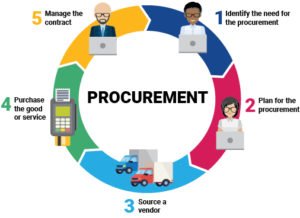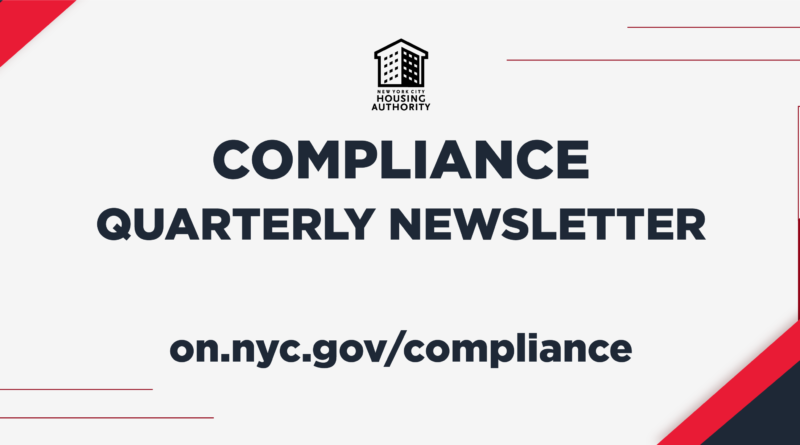Inspiring a Compliance Culture
Read the Compliance Department’s Quarterly Newsletter
Section 3 – Contractor and Development Partner Compliance
What is Section 3?
Section 3 is a requirement of the Housing and Urban Development (HUD) Act of 1968. The purpose of Section 3 is to leverage HUD funding to provide new employment, training, and contracting opportunities to low- and very low-income individuals, including public housing and Section 8 residents. Housing agencies that receive certain HUD funding, including NYCHA, are required to comply by hiring Section 3 workers, prioritizing the hiring of public housing residents and contracting with businesses that provide economic opportunities for public housing residents. A Section 3 worker is any worker whose income is below the HUD low-income threshold, or a worker who is employed by a Section 3 business concern (see more info below), or is a participant in a YouthBuild program.
New Rule and Benchmarks
On September 29, 2020, HUD published a new rule. The new rule applies to contracts executed after November 30, 2020, and to development projects with transaction closings on or after July 1, 2021. Among many changes, the new rule shifts the focus of Section 3 from tracking new hires to tracking labor hours and establishes a labor hour benchmark for Section 3 workers.
The new rule encourages contracting with Section 3 business concerns using the same labor hour benchmark. Section 3 business concerns are businesses majority-owned by public housing or Section 8 residents or low- or very low-income individuals, or businesses that hired Section 3 workers to perform more than 75 percent of their recent labor hours. Under the new rule, all labor hours worked on a project or contract by a Section 3 business concern count towards the Section 3 benchmarks, even if a worker for that business is not a low- or very low-income employee.
Cover Memo and Additional Information
In response to this new rule, the Procedures Unit in the Compliance Department added a cover memo to Standard Procedure 006:20:1, Section 3 – Contractor Compliance (Interim). The cover memo instructs staff on how to comply with the new regulations until the procedure is updated. Section 3 or equivalent requirements apply to all contracts for services at NYCHA, including small and micro-purchases. All staff involved in soliciting and monitoring contracts (for services) and development projects at NYCHA are instructed to follow the guidance in this memo as part of the procedure.
The memo includes an overview of the forms and processes that must be used to ensure compliance with the new requirements, a summary of NYCHA’s responsibilities for tracking compliance by department, and a chart summarizing how contractors should submit Section 3 forms to NYCHA based on the nature of the form and the contract type. For more information or questions on how to comply with Section 3 requirements, contact the Vendor Diversity Department at section3.smp@nycha.nyc.gov.
Procurement Admin Guide
 The Supply Management and Procurement Department (SMPD) developed the Procurement Admin Guide to provide a centralized database of resources that will help NYCHA staff understand and manage procurement processes. The Admin Guide includes an overview of the procurement process; guides on how to choose the appropriate procurement method; and a collection of useful forms, checklists, and templates. It can be found on SMPD’s NYCHA Connect page.
The Supply Management and Procurement Department (SMPD) developed the Procurement Admin Guide to provide a centralized database of resources that will help NYCHA staff understand and manage procurement processes. The Admin Guide includes an overview of the procurement process; guides on how to choose the appropriate procurement method; and a collection of useful forms, checklists, and templates. It can be found on SMPD’s NYCHA Connect page.
When choosing the appropriate procurement method, staff must first consider:
- Type of procurement – materials, services, or DECAR (Demolition, Excavation, Construction, Alteration, or Renovation);
- Approximate value of the procurement; and
- Funding source.
When this information is known, staff can use the Admin Guide for an overview on how to choose the correct procurement method. Staff can also find information on timelines and any additional steps based on the estimated value of the procurement. For more detailed information, refer to the Procurement Policy Manual.
In the Forms, Checklists, and Templates section of the Admin Guide, staff can access helpful documents to use in submitting and processing procurements. Staff can find information for administering departments; required vendor forms; and procurement internal checklists, resources, and templates. This section also provides quick access to commonly used forms, such as eForm 009.074, Service Procurement Request.
Micro-Purchases
The Contractor and Employment Opportunity Compliance (CEOC) Unit in the Compliance Department reviews development procurement practices regularly as part of the Compliance Department’s on-site monitoring program. During these reviews, CEOC found that many micro-purchases at NYCHA are priced at just less than $10,000, raising a red flag for potential fraud and abuse. To better understand compliance gaps and risks in NYCHA’s micro-purchase policies and procedures, CEOC, with assistance from the Quality Assurance Department, conducted an in-depth review of micro-purchases from March through May 2022. During the review, CEOC requested documents from 25 micro-purchase vendors and 66 developments. CEOC also visited 17 developments to interview management staff on a sample of micro-purchase requisitions and to inspect the completed work. During the review, CEOC identified several findings, including:
- Proposals: The proposal from the vendor should include the scope of work that will be performed and should detail pricing and labor. The Procurement Department has a Request for Proposal template in the Procurement Admin Guide that includes NYCHA’s General Terms and Conditions and requires that certain other supporting documentation be appended to the proposal (e.g., insurance certificates and Section 3 acknowledgments). Vendors should break down their proposal into the following categories and with the below level of detail:
|
Proposal Item |
Detail |
|
Materials |
Line-item description of each material item with brand, item name, serial number, quantity, and price |
|
Labor |
Breakdown of Prevailing Wage labor titles, wage rates, and total hours for the job |
|
Overhead |
Costs cannot exceed 10% of the total price |
|
Profit |
Profit cannot exceed 10% of the total price |
- Invoices: An invoice, prepared by the vendor and submitted to the Accounts Payable Department, should track the proposal and be retained by the development on-site for reference. It is critical that micro-purchase vendors itemize their invoices to track them against the more detailed proposal.
- Statements of Service: In some cases, CEOC found no evidence of work being done, or was unable to identify which vendor did the work when multiple vendors were doing the same type of work (e.g., fence repair or door repair). Compliance suggests that development staff maintain a Statement of Service upon completion of the work by a micro-purchase vendor that includes back-up information (including photographs) to ensure the work can be validated.
NYCHA staff must retain micro-purchase documentation such as Statements of Service, proposals, or invoices, which serve to document the work procured, the price paid, and that the development has signed off on the work provided by the vendor. CEOC is working with SMPD and Operations to address its findings so that NYCHA is charged appropriately for work performed. For more information and a guide on how to manage micro-purchases, see the Micro- and Small Procurements section of the Supply Management and Procurement page on NYCHA Connect.
Conclusion
The Compliance Department will continue working with our colleagues to ensure that NYCHA is a safe and healthy place for our residents, staff, and vendors. If you have any concerns or complaints, or if you see anyone engaging in a deceptive practice, you can make a confidential and anonymous report by calling the Customer Contact Center at (718) 707-7771 (select menu option 7) or by visiting the Compliance Department section of NYCHA’s website. Complaints also can be reported to any other federal, state, or local government agency. Remember, the Compliance Department is here to help.
90 Church Street
New York, NY 10007







